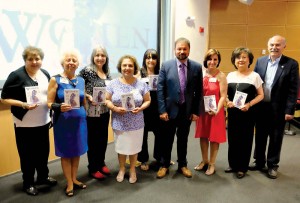
Photo: Alain Ekmalian
Elina Karapetyan
Staff Writer
On April 24, Armenians around the world came together for the 102nd anniversary of the Armenian Genocide. Pursuing worldwide recognition and honoring both survivors and lost souls of 1915 is incredibly important for the modern Armenian today.
On Sunday, April 30, a large audience gathered at the Fresno State Leon and Pete Peters Educational Center auditorium for a screening of the award winning documentary, “Women of 1915.” The film was followed by an interactive discussion with director Bared Maronian.
The screening was organized by the Fresno State Armenian Studies Program, the Women’s League of the Charlie Keyan Armenian Community School, the local chapters of the Armenian Relief Society, the Armenian Cultural Conservancy of Fresno, and the local branch of the Hamazkayin Armenian Educational & Cultural Society.
This emotionally stunning film explores the amazing resilience, bravery, and strength the women of 1915 demonstrated in the midst of battle and bloodshed. Frequently, when discussing the topic of war, women are customarily left out of the conversation, so Maronian felt a personal obligation to shed light on how incredibly important women were during this period because “…their stories needed to be told.”
The film is divided into several sections covering topics such as “Spellbinding Motherhood,” “The American Dream,” “Forced Assimilation,” and “Resilience,” all of which were relevant to the women of 1915. Maronian personified the tragedy by introducing individual women who made a significant difference in 1915. Interviewing the descendants of Genocide survivors was equally meaningful because they were the ones who went on to carry their ancestor’s legacy and achieve extraordinary accomplishments of their own. According to Maronian, the documentary required “ …both primary and secondary research techniques…” in order to fully encapsulate the true horrors of the Genocide.
The film first explores the life and legacy of Aurora Mardiganian, who most famously promoted Armenian Genocide awareness. She miraculously survived the Genocide and went on to share her painfully poignant story to the rest of the world. Her autobiographical book, Ravished Armenia and subsequent film, “Auction of Souls,” were incredibly successful in humanizing the tragedy, raising relief funds and awareness. The documentary shows footage of Mardiganian recounting how the Turks whipped her and said, “All of you are going to die. There will be no one single Armenian to live.” They slaughtered her loved ones before her eyes. Mardiganian died in Los Angeles in 1994, and was buried in an unmarked grave. Her work will continue to keep her spirit alive.
Victoria Artinian is another resilient woman, born in Urfa in 1894, who managed to escape annihilation with some members of her family. It was incredibly difficult to avoid the death marches, forced assimilations, rampant slaughter, rape, and murder. Women were particularly vulnerable because the men were killed first. The lives of some beautiful Armenian women were spared, while others were taken in as Turkish servants and wives. Under such devastating circumstances Artinian managed to flee to America. She settled in San Francisco with her husband Louis Hagopian and daughter Clara. Clara later married Paul Jobs, and after many years of struggling to create a family, the couple adopted a boy named Steve. Armenian genocide survivor Victoria Artinian is the grandmother of Steve Jobs, a man who single handedly revolutionized technology and the way people around the world live.
Maronian said that at times, the process of creating the documentary was emotionally draining. “As a professional filmmaker, I had to emotionally detach myself from the subject matter I was dealing with” in order to create the most authentic film that would immortalize the women of 1915.
“At times, it was beyond difficult to work on the film, specially during the post-production process where you have to watch a scene, listen to horrific human experiences and carry on your work,” said Maronian.
Maronian’s “Women of 1915” demands the rightful recognition of the Armenian Genocide and honors the incredible women who were at the forefront fighting for their people.
 Hye Sharzhoom Armenian Action
Hye Sharzhoom Armenian Action